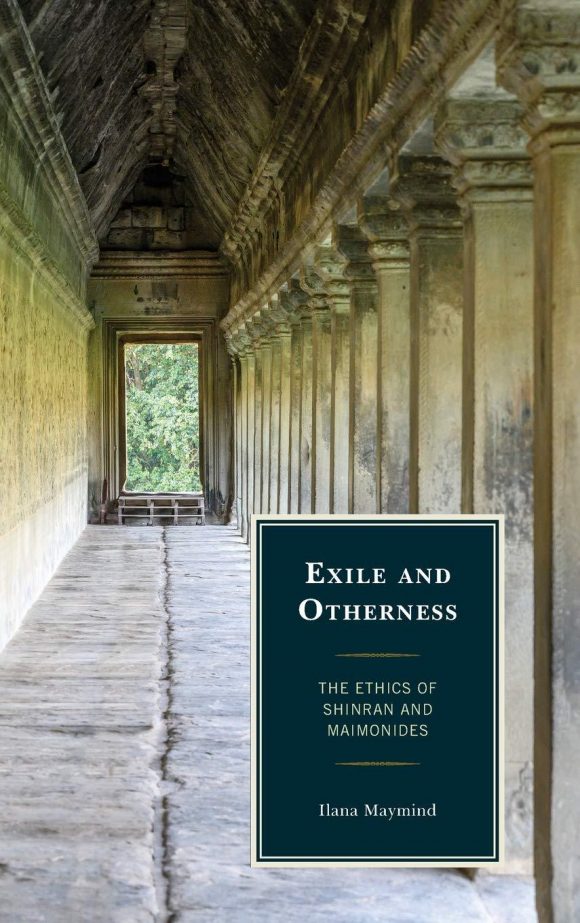Faculty Books: A Conversation on Exile and Otherness
August 21, 2020
Dr. Ilana Maymind, a lecturer for the religious studies department at Chapman University, recently published a book called, “Exile and Otherness: The Ethics of Shinran and Maimonides.” Maymind puts a strong emphasis on critical thinking and interdisciplinary comparisons in her studies and finds the topic of Eastern and Western comparative thought particularly interesting. She strives to not only incorporate these elements into all of the courses she teaches, such as Religion and Medicine and Women and Religion, but in her book as well.
Originally from Eastern Europe, Maymind is a recent transplant to California from t
he Midwest and believes that everyone can relate to exile in some form. According to her book, humans have a tendency to exclude others or look at each other and find differences, but recognizing that we are all complex beings with multifaceted personalities or experiences of exile can help us learn from each other.
The Voice of Wilkinson sat down with Maymind to discuss the premise of her book, what others can take away from reading it, and her thoughts on exile and otherness in relation to current social justice movements.
The Voice of Wilkinson: Your book focuses specifically on two thinkers, can you tell us more about what made you focus on these issues and people?
Dr. Ilana Maymind: “The book has some personal resonance for me because I was always interested in issues of exile, so I always thought that the idea of exile was broader than just limited to historic or theological [exile]. I also thought about the fact that there is no nation not affected by exile or transplants. I thought exile is something that allows us to look at issues of otherness because of what it means to be other from different perspectives. These are two very different thinkers. Moses ben Maimon (1138-1204), commonly known as Maimonides, [focuses on] medieval Judaism and Shinran (1173-1263) [focuses on] medieval Japanese Buhhdist thought, and one of the things that really interested me is the whole notion that east and west are seen as such separate entities. [I wanted to look at] what is uniting these people? Not to say that Buddhism and Judaism are similar, of course not, but I wasn’t looking at Buddhism and Judaism in general, I was looking at thinkers affected by those ways of thinking.”
VoW: You said that you tend to look at the east and west in everything you do, do you find that there  are more similarities than people tend to think?
are more similarities than people tend to think?
IM: “Yes and no. I think it depends on how you look at it. If we are focusing on only trying to find the differences, we will always find differences. If we look for similarities there will be some similarities. And people are surprised, saying ‘oh, this is very similar to what I was thinking’ or ‘I never thought about that before’ or ‘I wish my culture did that too’, so it can all be complimentary. I think it’s a very fruitful exchange. So yes there are similarities, but I don’t want to reduce these two systems to being similar. I think reserving the difference is very important.
VoW: You mentioned that writing this book resonated with you because you come from a different culture, what else did writing this book mean to you? And what do you hope other people will get from it?
IM: “The main issue that really interested me and what I think will interest others was looking at differences without preconceived notions, appreciating the differences, [and] appreciating the idea that there is otherness in everyone. We can look at someone and say that this person fits perfectly in a society, but then we can look at someone else and they look different or speak with an accent or have a different last name, and we kind of disregard them. I remember when I came to this country and I would start speaking, I would notice that people’s facial expressions would change because I don’t sound exactly the same. [It was] like what I was saying wasn’t relevant. It was really interesting, I would say ‘hello’ and the person would say ‘where are you from.’ It was so interesting, like how do [they] know from hello that I am from somewhere else? So that’s what got me initially interested, and when I was reading those two thinkers the idea that they were exiled and that exile doesn’t necessarily mean being exiled from the country. It means you might be exiled from your environment or you might exile from your family or all kinds of issues and I related it back to my first experience. I wasn’t born here, I came to this country and I was a transplant, but I was a part of this culture too because there were other people here too already. When you teach, you really realize how many students are in exile. They aren’t necessarily from a different culture, but they might be in exile from their family, they might be in exile from their friends or girlfriends or boyfriends and they’re trying to figure out how to behave. It’s actually more universal in a sense than just saying I’m from a different country, it might be more than that.
VoW: Earlier you talked about otherness and people “othering” each other, do you think, especially with everything going on in the world right now in terms of social justice movements, such as the Black Lives Matter Movement, do you see a lot of that happening or do you see crossover from what you talk about in your book?
IM: It’s interesting because when I started writing nothing was happening, even the refugee crisis was not there and I remember saying something like you never know at what point you can become a refugee. Then all of this happened and so much of this otherizing of people started taking place so much more and I can’t believe I was writing about it so many years ago. I am hopeful though. I’m really hopeful because something that really bothered me for a long time was the disregard [of] saying, ‘you are not like me’ or ‘I am not like you’ or ‘you don’t deserve’ [and that] will be fixed to some degree. It will take a long time, it’s not like it’s going to happen overnight. It will take a lot of hard work and a lot of soul searching. To me it’s always interesting when people say, ‘I’m not a racist, but’ or ‘I’m not an antisemite, but.’ I like this ‘but.’ What exactly is this ‘but’ that you are still trying to figure out? It’s going to take awhile and it’s going to take honest soul-searching because we can say all kinds of nice things, but actually changing our viewpoints and actually changing the way we relate to people takes work.



